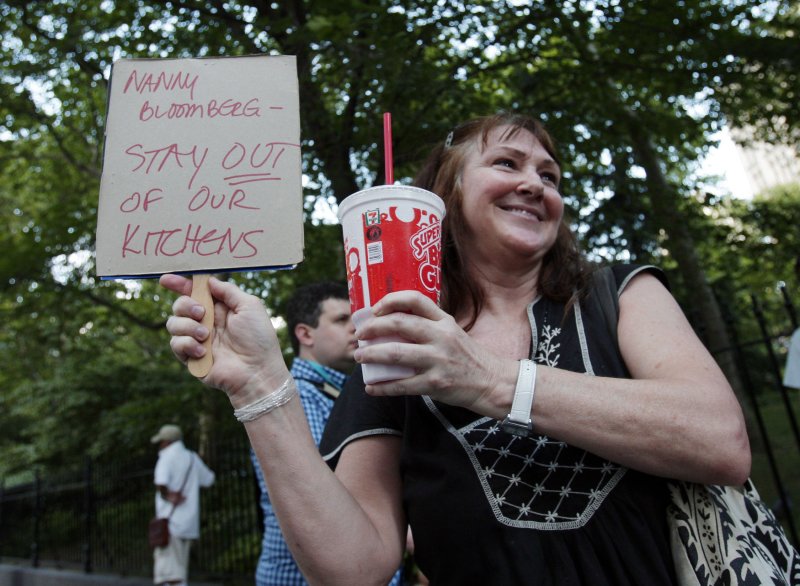1 of 2 | Protesters hold up signs at the "Million Big Gulp March" protest organized by the group NYC Liberty, City Council members and other demonstrators to express opposition to Mayor Michael R. Bloomberg's proposal to prohibit licensed food service establishments from using containers larger than 16 ounces to serve high-calorie drinks at City Hall Park in New York City on July 9, 2012. The proposed first-in-the-nation ban would impose a 16-ounce limit on the size of sweetened drinks sold at restaurants, movie theaters, sports venues and street carts. It would apply to bottled drinks as well as fountain sodas. UPI/John Angelillo |
License Photo
NEW YORK, Jan. 24 (UPI) -- New York City defended its so-called soda ban as a legal way of curbing obesity, but foes called it an unconstitutional overreach that limits personal liberty.
The measure, championed by Mayor Michael Bloomberg, would ban the sale of sugary soft drinks in sizes greater than 16 ounces at restaurants, movie theaters, street carts and stadiums. People could still buy multiple drinks.
The limits, announced in May 2012, are scheduled to go into effect in March.
Other cities and states have since pursued similar measures. Massachusetts Gov. Deval Patrick proposed Wednesday that soft drinks no longer be exempt from sales tax. Lawmakers in Hawaii and Nebraska have also proposed higher taxes on sales of sugary drinks, The New York Times said.
New York City attorneys told state Supreme Court Justice Milton Tingling the restrictions were well within the city Board of Health's purview to regulate public health matters.
But lawyers for the beverage industry and business groups argued the board had reached beyond the limits of its authority by approving the new rules without City Council approval.
The beverage industry said it would request a stay to delay the new restrictions until the case is decided.
American Beverage Association attorney James Brandt said the rules would unduly hurt small-business owners who would lose sales to nearby drug and grocery stores that are not affected.
"If you want 17 ounces of lemonade and you're in the wrong store, then you're in the wrong city, because you can't buy that here," The Wall Street Journal quoted Brandt as saying.
He argued the rules were unfair because they didn't include products containing milk. He questioned the nutritional value of milkshakes.
He also called the 16-ounce limit arbitrary, having "no justification in science."
City attorney Thomas Merrill said more than two out of every 10 New Yorkers were clinically obese and could easily develop diabetes and other health problems.
"There is ample evidence that there is an obesity epidemic being driven by sugary beverages," the Journal quoted him as saying. "There is ample evidence showing that sugary beverages are associated directly with diabetes."
He said milk drinks were not included because milk is filling and has nutritional value. This contrasts with soft drinks, which he said have no nutritional value and were the largest source of added sugar in the American diet.
Merrill also said the 16-ounce size was selected because it was "doable" as a commonly available size.
He also said restaurants were included in the law while some other types of establishments weren't, simply because they are regulated by the city Health Department.
Tingling did not comment on the arguments, The New York Times said.















